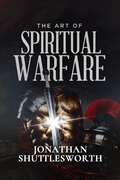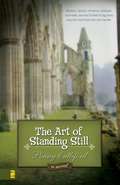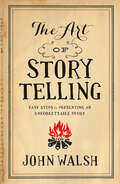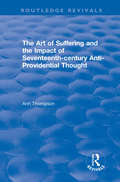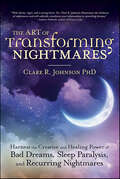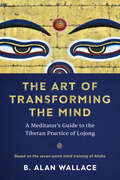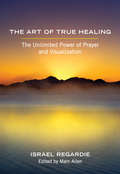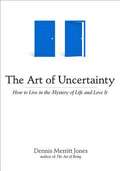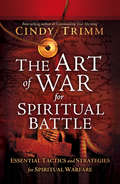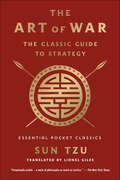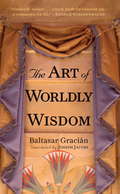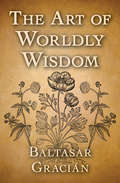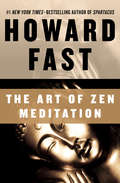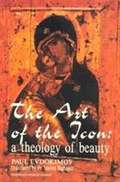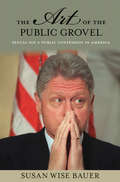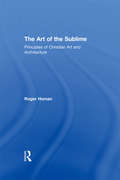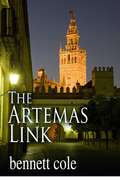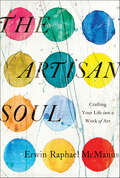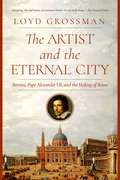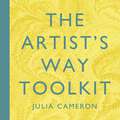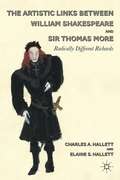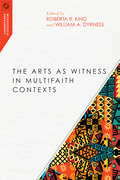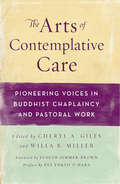- Table View
- List View
The Art of Spiritual Warfare
by Jonathan ShuttlesworthLive Your God-Given Destiny Through The Art of Spiritual Warfare by Jonathan ShuttlesworthThe blessings promised by God—prosperity, health, and victory over sin—do not come without a fight. Whether you’ve felt the sting of defeat or are weary from battle, “The Art of Spiritual Warfare” is your call to arms. It’s for those ready to stand firm in the face of adversity, armed with the knowledge and faith that no battle is too great with God.Jonathan Shuttlesworth does not just recount tales of biblical victories; he translates them into practical, actionable strategies. Whether battling for your health, prosperity, or the salvation of loved ones, this book demonstrates that victory is always within reach when you understand God’s provision.You Will Learn:•Practical steps you can take to overcome forces that oppose your inheritance.•How to move from being under siege in your spiritual life to being an overcomer, equipped to face adversaries confidently.•Tangible examples of victories—from securing properties to transforming lives marred by addiction.•Life doesn’t need to be filled with chaos; you can achieve victory and peace amid life’s storms.This isn’t merely an academic book; it’s a weapon for those ready to claim victory and live the abundant life promised by God. It’s time to abandon victimhood and fight the right battles, battles that lead to tangible rewards and align with your God-given destiny.About the Author:Jonathan Shuttlesworth is an evangelist and founder of Revival Today, a global ministry dedicated to reaching lost and hurting people with the Gospel of Jesus Christ. He is also the pastor of Revival Today Church, a Holy Spirit-filled, Bible-believing church that blesses families and the nation.
The Art of Standing Still
by Penny CullifordNothing much ever happens in Monksford. Even so, reporter Jemma Durham dreams of the story that will take her from the small Monksford Gazetteto a national newspaper. Then the town revives the tradition of the medieval mystery plays that were performed across England hundreds of years ago—and life in Monksford turns decidedly more interesting.
The Art of Storytelling: Easy Steps to Presenting an Unforgettable Story
by John WalshCan you captivate an audience with your story?Many of us would love to hold the attention of a crowd, a classroom, or just a group of our friends by telling them a great story. We have felt the pressure of a public presentation or the disappointment of telling a story that others ignore. We are ready to be heard, ready to captivate.In The Art of Storytelling, John Walsh takes us through the steps to presenting a compelling story—outlining the strategies that helped him move from stutterer to storyteller. This book will help any person with a story to share by walking you through all aspects of presentation . . . from what to do with your hands as you speak all the way to crafting a killer ending. Whether you&’re telling bedtime stories to your children or Bible stories to a congregation, this book will take your storytelling to a new level.
The Art of Storytelling: Easy Steps to Presenting an Unforgettable Story
by John WalshCan you captivate an audience with your story?Many of us would love to hold the attention of a crowd, a classroom, or just a group of our friends by telling them a great story. We have felt the pressure of a public presentation or the disappointment of telling a story that others ignore. We are ready to be heard, ready to captivate.In The Art of Storytelling, John Walsh takes us through the steps to presenting a compelling story—outlining the strategies that helped him move from stutterer to storyteller. This book will help any person with a story to share by walking you through all aspects of presentation . . . from what to do with your hands as you speak all the way to crafting a killer ending. Whether you&’re telling bedtime stories to your children or Bible stories to a congregation, this book will take your storytelling to a new level.
The Art of Suffering and the Impact of Seventeenth-century Anti-Providential Thought
by Ann ThompsonThis title was first published in 2003. 'The art of suffering' is one of many strands of literature on suffering published in the sixteenth and seventeenth centuries. This book explores through the art of suffering the way in which the meaning for suffering, which the seventeenth century inherited from the Middle Ages and which centres on the role of suffering as a manifestation of the hand of God in the process of salvation, is refined and enhanced by successive puritan writers only to crumble under the impact of emerging anti-providential thought. It goes on to explore the challenge which the absence of meaning for suffering presents to the Judaeo-Christian concept of an omnipotent and infinitely good God, and the ways in which themes and doctrines already present in the literature on suffering are reshaped and recombined to defend the omnipotence and infinite goodness of God.
The Art of Transforming Nightmares: Harness the Creative and Healing Power of Bad Dreams, Sleep Paralysis, and Recurring Nightmares
by Clare R. JohnsonTransform Nightmares into Healing, Creative, Spiritual GiftsThe Art of Transforming Nightmares is a friendly, hands-on guide to help you tap into the immensely rich gifts that bad dreams offer up when we work with them in healing ways. Dr. Clare Johnson, world-leading expert on lucid dreaming, shares her best practical tips for overcoming nightmares and a unique quiz that identifies your personal sleeper-dreamer type so you can fast-track to the transformative techniques that work best for you.With forty-five practices and fifteen tailor-made nightmare solution programs, this guidebook helps you set up your own unique program for transforming your dream life. It shares practical tools to reduce nightmare frequency, manage sleep paralysis, resolve distressing dreams, and release fear. You'll tap into the deep wisdom of your unconscious mind and discover how to transform your night of sleep into a beautiful, healing refuge so that you wake up energized and ready to lead a life of happiness and wonder.
The Art of Transforming the Mind: A Meditator’s Guide to the Tibetan Practice of Lojong
by B. Alan WallaceTibetan Buddhist practice isn't just sitting in silent meditation, it's developing fresh attitudes that align our minds with reality. Includes three new translations of Atisha&’s source material.In this book, B. Alan Wallace explains a fundamental type of mental training that is designed to shift our attitudes so that our minds become pure wellsprings of joy instead of murky pools of problems, anxieties, fleeting pleasures, hopes, and frustrations. The lojong—or mind-training—teachings have been the subject of profound study, contemplation, and commentary by many great masters. Wallace shows us the way to develop our capacity for spiritual awareness through his relatable and practical commentary on the mind-training slogans.
The Art of True Healing: The Unlimited Power of Prayer and Visualization
by Israel RegardieThe Art of True Healing details a powerful exercise that stimulates the body, mind, and spirit to help us create physical health and personal success. Originally published in 1932, predating by more than a half century the current interest in the mind’s power to heal, this concise work guides readers through what Israel Regardie calls the Middle Pillar meditation — a technique that combines the mystical concepts of yoga’s chakras and the Kabbalah’s Tree of Life to create a simple and effective healing tool. In this edition, editor Marc Allen brings Regardie’s work into the twenty-first century — showing us how to unleash energy to heal our bodies and, ultimately, every part of our lives. Like few books before or since, The Art of True Healing provides both the theory and practices necessary for attaining well-being and fulfillment.
The Art of Uncertainty: How to Live in the Mystery of Life and Love It
by Dennis Merritt JonesWhat if we could learn to accept I don't know and embrace the possibility that the future is full of mystery, excitement, and unlimited opportunity? The Art of Uncertainty is an invitation to the reader to consider its essential message: learning to love the unknown by staying present in the moment. If the difficulties of recent years have taught us anything-particularly those who "did everything right" and still saw it all fall apart-it's that none of us has as much control over our lives as we believe. The only thing we can control is our next thought. What if we could learn how to be at peace with uncertainty and embrace the possibility that the future is full of mystery, excitement, and unlimited opportunity? What if we discovered that a new paradigm can be more fulfilling, more rewarding, and more peaceful than what we have known? Living in the I don't know and loving it is an art form we can all master, and The Art of Uncertainty is the perfect guidebook.
The Art of War for Spiritual Battle: Essential Tactics and Strategies for Spiritual Warfare
by Cindy TrimmThis new book by best-selling author Cindy Trimm, The Art of War for Spiritual Battle will become the &“go-to&” manual for preparing Christians to have victory in today&’s spiritual battles with the enemy through strategic spiritual warfare and powerful intercessory prayer. Using occasional relevant quotes from the classic book, The Art of War by Sun Tzu, long a manual of wisdom for handling conflict of any kind, Trimm teaches the necessary disciplines for a modern-day prayer warrior. The principles in this book include tactics for organizing prayer, protocols for enforcing your authority as you wage your prayer campaign, and strategies for establishing and expanding God&’s kingdom wherever you are.
The Art of War: The Classic Guide to Strategy (Essential Pocket Classics)
by Sun TzuSun Tzu’s The Art of War offers the wisdom of ancient China for the modern reader Originally written in the 5th century, The Art of War is a masterpiece of military strategy and Chinese philosophy that has influenced countless leaders, both on the battlefield and in the boardroom. The exhortations and advice from The Art of War have echoed throughout the centuries as pieces of timeless wisdom, no matter the foe you may be facing. This edition of the timeless classic uses Lionel Giles’s brilliant translation of the original text, re-designed with a modern look and a pocket-size trim that’s perfect for gift giving. Whether they’re students or salespeople, readers everywhere will benefit from Sun Tzu’s profound insights into human behavior.
The Art of Worldly Wisdom
by Baltasar GracianThis perenially popular book of advice on how to achieve personal and professional success is valued for its timeless insights on how to make one's way in the world. Written in the seventeenth century by a Spanish Jesuit scholar, the teachings are strikingly modern in tone and address universal concerns such as friendship, morality, effective leadership, and how to manage one's emotions. The Art of Worldly Wisdom is for anyone seeking to combine ethical behavior with worldly success.This edition includes an introduction by Willis Barnstone, former Distinguished Professor of Spanish and Comparative Literature at Indiana University. Barnstone, a noted translator, critic, and poet, explores Gracian's background and places him within his historical and literary context. Like Sun Tzu's Art of War, Machiavelli's Prince, and Lao Tzu's Tao Te Ching, Gracian's Art of Worldly Wisdom is one of those rare books that serve as enlightening guides and companions for life.
The Art of Worldly Wisdom
by Baltasar GraciánLife guidance from a famed Renaissance man. This influential work of philosophy by one of the great thinkers of the Renaissance era advises people of all walks of life how to approach political, professional, and personal situations in a dog-eat-dog world. Comprised of three hundred pithy aphorisms, it offers thought-provoking and accessible advice. Some subjects include &“Never Compete,&” &“The Art of Letting Things Alone,&” and &“Anticipate Injuries and Turn Them into Favours.&” This ebook has been professionally proofread to ensure accuracy and readability on all devices.
The Art of Zen Meditation
by Howard FastBestselling author Howard Fast&’s straightforward introduction to Zen meditationHoward Fast began to formally practice Zen meditation after turning away from communism in 1956. The Art of Zen Meditation, originally published by the antiwar political collective Peace Press in 1977, is the fruit of Fast&’s study: a brief and instructive history of Zen Buddhism and its tenets, written with a simplicity that is emblematic of the philosophy itself. Fast&’s study of Zen also inspired his popular Masao Masuto mystery series about a Zen Buddhist detective in Beverly Hills, which he published under the pseudonym E. V. Cunningham. The Art of Zen Meditation is illustrated with twenty-three beautiful photographs. This ebook features an illustrated biography of Howard Fast including rare photos from the author&’s estate.
The Art of the Icon: A theology of beauty
by Paul EvdokimovBeauty, The Sacred, The Theology of the Icon, A Theology of Vision.
The Art of the Public Grovel: Sexual Sin and Public Confession in America
by Susan Wise BauerWhether you are a politician caught carrying on with an intern or a minister photographed with a prostitute, discovery does not necessarily spell the end of your public career. Admit your sins carefully, using the essential elements of an evangelical confession identified by Susan Wise Bauer in The Art of the Public Grovel, and you, like Bill Clinton, just might survive. In this fascinating and important history of public confession in modern America, Bauer explains why and how a type of confession that first arose among nineteenth-century evangelicals has today become the required form for any successful public admission of wrongdoing--even when the wrongdoer has no connection with evangelicalism and the context is thoroughly secular. She shows how Protestant revivalism, group psychotherapy, and the advent of talk TV combined to turn evangelical-style confession into a mainstream secular rite. Those who master the form--Bill Clinton, Jimmy Swaggart, David Vitter, and Ted Haggard--have a chance of surviving and even thriving, while those who don't--Ted Kennedy, Jim Bakker, Cardinal Bernard Law, Mark Foley, and Eliot Spitzer--will never really recover. Revealing the rhetoric, theology, and history that lie behind every successful public plea for forgiveness, The Art of the Public Grovel will interest anyone who has ever wondered why Clinton is still popular while Bakker fell out of public view, Ted Kennedy never got to be president, and Law moved to Rome.Some images inside the book are unavailable due to digital copyright restrictions.
The Art of the Sublime: Principles of Christian Art and Architecture
by Roger HomanIn the view of Hegel and others, pagan art is the art of the beautiful and Christian art is the art of the sublime. Roger Homan provides a comprehensive and informative account of the course of Christian art, encompassing a re-evaluation of conventional aesthetics and its application to religious art. Homan argues that taste and aesthetics are fashioned by morality and belief, and that Christian art must be assessed not in terms of its place in the history of art but of its place in Christian faith. The narrative basis of Christian art is documented but religious art is also explored as the expression of the devout and as an element in the trappings of collective expression and personal quest. Sections in the book explore pilgrimage art, puritan art, the tension of Gothic and Classical, church architecture and the language of worship. Current areas of debate, including the relationship of ethics to the appreciation of art, are also discussed. An extensive range of examples of painting, architecture and decoration, most of which are of European origin, are discussed throughout, with a number of striking illustrations included within the text.
The Artemas Link
by Bennett ColeYoung Pastor Mark Mercer's search for a treasure--a lost epistle of St. Paul--leads him to Salonika, Greece, and to an attractive young American archeologist, Priscilla Krikorian. An initial personality clash gives way to a serendipitous combining of their respective abilities as they embark on a whirlwind sleuthing adventure that takes them to Seville, Spain. Their budding romantic relationship is interrupted when Priscilla is kidnapped, but Mark devises a bold and clever plan to rescue her. Will it work? And what is the treasure that he brings back to the U.S.?
The Artisan Soul: Crafting Your Life into a Work of Art
by Erwin Raphael McManusA national bestselling self-help guide to the creative process from the founder of MOSAIC, an LA-based spiritual community “well-known for its creativity” (Publishers Weekly).In The Artisan Soul, Erwin Raphael McManus, author, thought leader, and founder of MOSAIC in Los Angeles, pens a manifesto for human creativity and the beginning of a new renaissance. McManus not only calls us to reclaim our creative essence but reveals how we can craft our lives into a work of art. There are no shortcuts to quality, and McManus celebrates the spiritual process that can help us discover our true selves.McManus demonstrates that we all carry within us the essence of an artist. We all need to create, to be a part of a process that brings to the world something beautiful, good, and true, in order to allow our souls to come to life. It's not only the quality of the ingredients we use to build our lives that matter, but the care we bring to the process itself. Just like baking artisan bread, it's a process that's crafted over time. And God has something to say about how we craft our lives. With poignant, inspirational stories and insights from art, life, history, and scripture interspersed throughout, McManus walks readers through the process of crafting a life of beauty and wonder.
The Artist and the Eternal City: Bernini, Pope Alexander VII, and The Making of Rome
by Loyd GrossmanThis brilliant vignette of seventeenth-century Rome, its Baroque architecture, and its relationship to the Catholic Church brings to life the friendship between a genius and his patron with an ease of writing that is rare in art history.By 1650, the spiritual and political power of the Catholic Church was shattered. Thanks to the twin blows of the Protestant Reformation and the Thirty Years War, Rome—celebrated both as the Eternal City and Caput Mundi (the head of the world)—had lost its preeminent place in Europe. Then a new Pope, Alexander VII, fired with religious zeal, political guile, and a mania for creating new architecture, determined to restore the prestige of his church by making Rome the key destination for Europe's intellectual, political, and cultural elite. To help him do so, he enlisted the talents of Gianlorenzo Bernini, already celebrated as the most important living artist—no mean feat in the age of Rubens, Rembrandt, and Velazquez.
The Artist's Way Toolkit: How to Use the Creative Practices
by Julia CameronHailed as the Queen of Creativity, Julia Cameron is the authority on artistic life and has brought her wisdom to millions around the world. The four essential, accessible tools she has been famed for over her lifelong career-MorningPages, Artist Dates, Walks and Guidance- have transformed lives. Now, for the first time, they are presented together, along with her readers' most commonly asked questions.Offering a deep dive into each tool, Cameron demonstrates how to set ourselves firmly on path to self-love and creative nourishment. Thanks to the learned experience of a lifetime of teaching and writing about creative recovery, she generously delivers inspiring stories and practices to guide us back to discovery.
The Artistic Links Between William Shakespeare and Sir Thomas More
by Charles A. Hallett Elaine S. HallettApproaching the subject from a dramaturgical point of view, this investigation differs from anything that has been written about the relationship between Thomas More and William Shakespeare. This book defines, in specific terms, what Shakespeare learned from his study of More's "History"and how he exploited that knowledge to heighten the drama. "
The Arts as Witness in Multifaith Contexts (Missiological Engagements)
by William A. Dyrness Roberta R. KingIn search of holistic Christian witness, missionaries have increasingly sought to take into account all the dimensions of people's cultural and religious lives—including their songs, dances, dramatic performances, storytelling, and visual arts.
The Arts of Contemplative Care
by Judith Simmer-Brown Pat Enkyo O'Hara Cheryl A Giles Willa B MillerPowerful and life-affirming, this watershed volume brings together the voices of pioneers in the field of contemplative care--from hospice and hospitals to colleges, prisons, and the military. Illustrating the day-to-day words and actions of pastoral workers, each first-person essay in this collection offers a distillation of the wisdom gained over years of compassionate experience. The stories told here are sure to inspire--whether you are a professional caregiver or simply feel inclined toward guiding, healing, and comforting roles. If you are inspired to read this book, or even one touching story in it, you just might find yourself inspired to change a life.
The Arts of Contemplative Care: Pioneering Voices in Buddhist Chaplaincy and Pastoral Work
by Judith Simmer-Brown Pat Enkyo O'Hara Cheryl A Giles Willa B MillerPowerful and life-affirming, this watershed volume brings together the voices of pioneers in the field of contemplative care--from hospice and hospitals to colleges, prisons, and the military. Illustrating the day-to-day words and actions of pastoral workers, each first-person essay in this collection offers a distillation of the wisdom gained over years of compassionate experience. The stories told here are sure to inspire--whether you are a professional caregiver or simply feel inclined toward guiding, healing, and comforting roles. If you are inspired to read this book, or even one touching story in it, you just might find yourself inspired to change a life.
